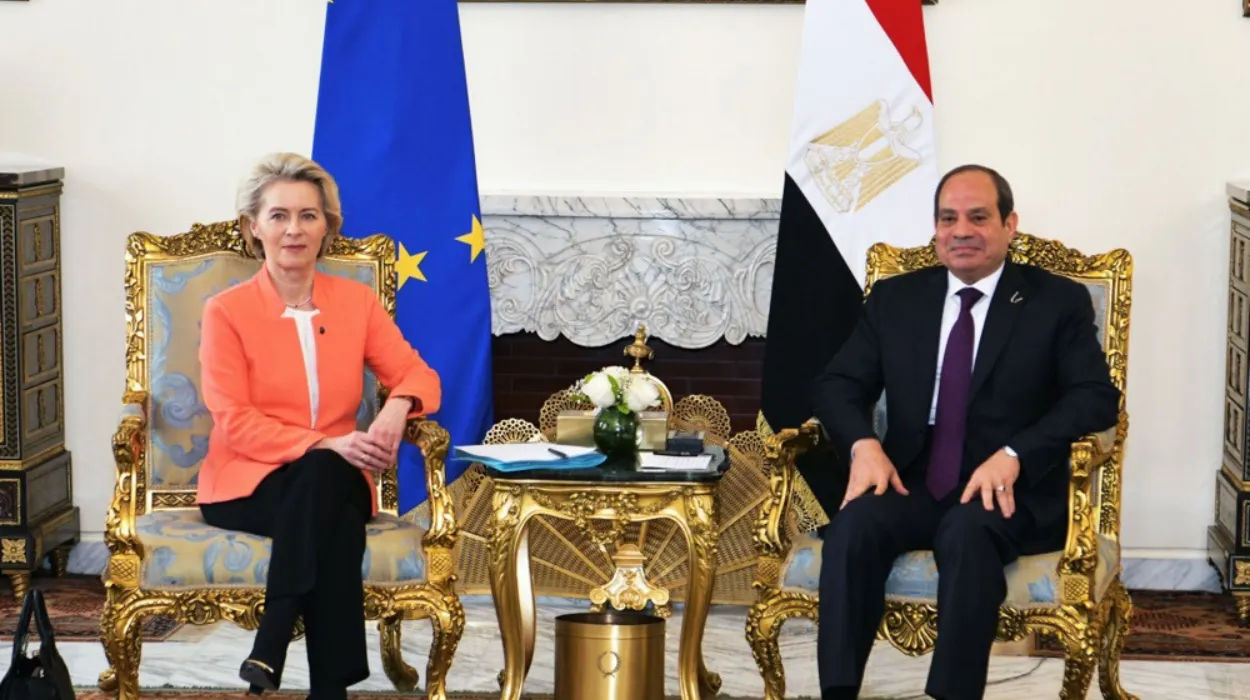Egypt (Transatlantic Today)—The European Union (EU) and Egypt have entered into a €7.4 billion financial package aimed at strengthening economic ties, boosting energy sales to Europe, and addressing irregular migration. The deal, signed on Sunday, was witnessed by European Commission President Ursula von der Leyen alongside leaders from Austria, Belgium, Cyprus, Greece, and Italy. Egyptian President Abdel Fattah al-Sisi hosted the ceremony in Cairo.
“This agreement elevates the EU-Egypt relationship to a Strategic and Comprehensive Partnership,”
von der Leyen announced. She emphasized that the deal encompasses initiatives in trade, low-carbon energy, migration management, and cultural collaboration.
Financial Support for Economic Revival
The agreement allocates €5 billion in loans over four years, €1.8 billion for investments, and hundreds of millions for projects targeting bilateral priorities such as migration and energy infrastructure. A significant focus is on increasing gas exports to Europe to reduce dependency on Russian energy sources.
The deal comes as Egypt grapples with a severe economic crisis, exacerbated by inflation and surging debt. The country’s external debt stands at nearly $165 billion, with servicing costs projected to reach $42 billion this year.
Migration and Security Cooperation
The EU’s commitment also addresses irregular migration. Egypt, which borders Libya and Sudan—regions plagued by conflict—hosts approximately 9 million migrants, including large populations of Sudanese and Syrians. EU officials highlighted enhanced cooperation on border security and counter-terrorism as critical components of the deal.
Belgian Prime Minister Alexander De Croo underscored the need for collaboration to curb irregular migration.
“Creating opportunities for the youth is essential to addressing root causes,”
he said.
Human Rights Concerns
While the agreement marks a pivotal moment for EU-Egypt relations, it has drawn criticism from human rights groups. Organizations such as Human Rights Watch have condemned the EU’s approach, alleging that it supports authoritarian regimes and undermines efforts by local activists and human rights defenders.
Economic Challenges
The deal also aligns with recent reforms implemented by Egypt to secure an $8 billion loan from the International Monetary Fund. Despite this assistance, the nation continues to face economic hardships, including disrupted revenues from the Suez Canal due to regional instability.
The EU-Egypt partnership reflects a strategic alignment amid regional challenges and global economic shifts. As both entities seek to balance immediate priorities and long-term goals, the agreement lays the groundwork for deeper collaboration across economic and social domains.


























